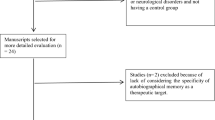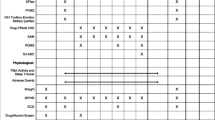Abstract
Rationale
Low-dose acute tryptophan depletion (LD-ATD), while having no effect on mood, has been shown to reduce specificity of autobiographical memory in patients who have recovered from a depressive episode.
Objectives
This study aimed to explore if reduced specificity of autobiographical memory with LD-ATD is common to other groups of individuals at risk of depression, specifically a healthy population with a family history of depression.
Methods
Nineteen healthy young adults with at least one first-degree relative with a history of major depression were recruited. LD-ATD drinks containing 1.15 g of tryptophan (T+) or no tryptophan (T−) were administered on two separate occasions, in a double blind random order crossover design. The Autobiographical Memory Test (AMT) was administered 5 h after drink administration.
Results
Analysis of variance revealed a significant difference in the effects of LD-ATD drinks on plasma free tryptophan with no mood change with either drink. There was no within-subject main effect of LD-ATD on the memory task. However, there was a main effect of order of drink. Exploratory analysis of visit 1 data indicated a large between-subject effect (d = 1.4) of LD-ATD on AMT with T− associated with less specificity in response to negative cue words (F(1, 17) = 8.71, p = 0.009).
Conclusions
Similar to findings following recovery from depression, LD-ATD can reduce specificity of AMT in the absence of lowered mood in healthy individuals with a strong family history of depression. These findings may reflect a 5-HT-dependent cognitive vulnerability to depression in different populations and warrant further research.

Similar content being viewed by others
References
Alhaj HA (2009) Effects of adrenal steroids on mood and memory: electrophysiological studies in depressed patients and healthy subjects. LAP Lambert Academic, Saarbrücken
Anderson IM (1998) SSRIS versus tricyclic antidepressants in depressed inpatients: a meta-analysis of efficacy and tolerability. Depress Anxiety 7(Suppl 1):11–17
Arroll B, Macgillivray S, Ogston S, Reid I, Sullivan F, Williams B, Crombie I (2005) Efficacy and tolerability of tricyclic antidepressants and SSRIs compared with placebo for treatment of depression in primary care: a meta-analysis. Ann Fam Med 3(5):449–456
Au Yeung C, Dalgleish T, Golden A-M, Schartau P (2006) Reduced specificity of autobiographical memories following a negative mood induction. Behav Res Ther 44(10):1481–1490
Badawy AAB, Morgan CJ, Dougherty DM, Marsh DM, Mathias CW, Jagar AA, Addicott MA et al (2007) The acute tryptophan depletion and loading tests: specificity issues. Int Congr Ser 1304:159–166
Beck AT, Ward CH, Mendelson M, Mock J, Erbaugh J (1961) An inventory for measuring depression. Arch Gen Psychiatry 4(6):561–571
Bond A, Lader M (1974) The use of analogue scales in rating subjective feelings. Br J Med Psychol 47:211–218
Brittlebank AD, Scott J, Williams JM, Ferrier IN (1993) Autobiographical memory in depression: state or trait marker? Br J Psychiatry 162(1):118–121
Conway MA, Rubin DC (1993) The structure of autobiographical memory. In Theories of memory. Lawrence Erlbaum Associates, Hove, East Essex, UK. 103–137
Endicott J, Andreasen N, Spitzer R (1975) Family history research diagnostic criteria. New York Biometrics Research, New York Psychiatric Institute, New York
Haddad A, Williams J, McTavish S, Harmer C (2009) Low-dose tryptophan depletion in recovered depressed women induces impairments in autobiographical memory specificity. Psychopharmacology 207(3):499–508
Hamilton M (1960) A rating scale for depression. J Neurol Neurosurg Psychiatry 23:56–62
Harrison BJ, Olver JS, Norman TR, Burrows GD, Wesnes KA, Nathan PJ (2004) Selective effects of acute serotonin and catecholamine depletion on memory in healthy women. J Psychopharmacol 18(1):32-40
Hayward G, Goodwin GM, Cowen PJ, Harmer CJ (2005) Low-dose tryptophan depletion in recovered depressed patients induces changes in cognitive processing without depressive symptoms. Biol Psychiatry 57(5):517–524
Hughes JH, Gallagher P, Stewart ME, Matthews D, Kelly TP, Young AH (2003) The effects of acute tryptophan depletion on neuropsychological function. J Psychopharmacol 17(3):300–309
Klaassen T, Riedel WJ, van Someren A, Deutz NEP, Honig A, van Praag HM (1999) Mood effects of 24-hour tryptophan depletion in healthy first-degree relatives of patients with affective disorders. Biol Psychiatry 46(4):489–497
Lemogne C, Piolino P, Friszer S, Claret A, Girault N, Jouvent R, Allilaire J-F et al (2006) Episodic autobiographical memory in depression: specificity, autonoetic consciousness, and self-perspective. Conscious Cogn 15(2):258–268
McAllister-Williams RH, Massey AE, Rugg M (2002) Effects of tryptophan depletion on brain potential correlates of episodic memory retrieval. Psychopharmacology 160(4):434–442
McNair DM, Lorr M, Droppelman LF (1971) Manual for the profile of mood states. Educational Testing Services, San Diego
Meltzer HY (1990) Role of serotonin in depression. Ann N Y Acad Sci 600(1):486–499
Mendelsohn D, Riedel WJ, Sambeth, A (2009) Effects of acute tryptophan depletion on memory, attention and executive functions: A systematic review. Neurosci Biobehav Rev 33(6):926–952
Murphy FC, Smith KA, Cowen PJ, Robbins TW, Sahakian BJ (2002) The effects of tryptophan depletion on cognitive and affective processing in healthy volunteers. Psychopharmacology 163(1):42–53
Nelson HE (1982) National Adult Reading Test (NART): test manual. NFER-Nelson, Windsor
Raes F, Hermans D, de Decker A, Eelen P, Williams JMG (2003) Autobiographical memory specificity and affect regulation: an experimental approach. Emotion 3(2):201–206
Raes F, Hermans D, Williams JMG, Demyttenaere K, Sabbe B, Pieters G, Eelen P (2005) Reduced specificity of autobiographical memory: a mediator between rumination and ineffective social problem-solving in major depression? J Affect Disord 87(2–3):331–335
Raes F, Hermans D, Williams JMG, Eelen P (2006) Reduced autobiographical memory specificity and affect regulation. Cogn Emot 20(3–4):402–429
Reilly JG, McTavish SFB, Young AH (1997) Rapid depletion of plasma tryptophan: a review of studies and experimental methodology. J Psychopharmacol 11(4):381–392
Ruhe HG, Mason NS, Schene AH (2007) Mood is indirectly related to serotonin, norepinephrine and dopamine levels in humans: a meta-analysis of monoamine depletion studies. Mol Psychiatry 12(4):331–359
Schmitt JAJ, Jorissen BL, Sobczak S, van Boxtel MPJ, Hogervorst E, Deutz NEP, Riedel WJ (2000) Tryptophan depletion impairs memory consolidation but improves focussed attention in healthy young volunteers. J Psychopharmacol 14(1):21–29
Sheehan DV, Lecrubier Y, Sheehan KH, Amorim P, Janavs J, Weiller E, Hergueta T et al (1998) The Mini-International Neuropsychiatric Interview (M.I.N.I): the development and validation of a structured diagnostic psychiatric interview for DSM-IV and ICD-10. J Clin Psychiatry 59(Suppl 20):22–33
Smith KA, Fairburn CG, Cowen PJ (1997) Relapse of depression after rapid depletion of tryptophan. Lancet 349(9056):915–919
Sullivan PF, Neale MC, Kendler KS (2000) Genetic epidemiology of major depression: review and meta-analysis. Am J Psychiatry 157(10):1552–1562
Sumner JA, Griffith JW, Mineka S (2010) Overgeneral autobiographical memory as a predictor of the course of depression: a meta-analysis. Behav Res Ther 48(7):614–625
Symonds CS, Gallagher P, Thompson JM, Young, AH (2004) Effects of the menstrual cycle on mood, neurocognitive and neuroendocrine function in healthy premenopausal women. Psychol Med 34(01):93–102
Van der Does AJW (2001) The effects of tryptophan depletion on mood and psychiatric symptoms. J Affect Disord 64(2–3):107–119
van Vreeswijk MF, de Wilde EJ (2004) Autobiographical memory specificity, psychopathology, depressed mood and the use of the Autobiographical Memory Test: a meta-analysis. Behav Res Ther 42(6):731–743
Williams JMG, Broadbent K (1986) Autobiographical memory in suicide attempters. J Abnorm Psychol 95(2):144–149
Williams J, Ellis N, Tyers C, Healy H, Rose G, Macleod A (1996) The specificity of autobiographical memory and imageability of the future. Mem Cognit 24(1):116–125
Williams JMG, Barnhofer T, Crane C, Herman D, Raes F, Watkins E, Dalgleish T (2007) Autobiographical memory specificity and emotional disorder. Psychol Bull 133(1):122–148
Young SN, Smith SE, Pihl RO, Ervin FR (1985) Tryptophan depletion causes a rapid lowering of mood in normal males. Psychopharmacology 87(2):173–177
Zimmerman M, Coryell W (1987) The Inventory to Diagnose Depression (IDD): a self-report scale to diagnose major depressive disorder. J Consult Clin Psychol 55(1):55–59
Acknowledgements
The authors would like to thank Prof. Abdulla A.B. Badawy for assistance in performing the amino acid assays. The study was supported by Northumberland, Tyne and Wear NHS Foundation Trust and Newcastle University.
Conflict of interest
None.
Author information
Authors and Affiliations
Corresponding author
Rights and permissions
About this article
Cite this article
Alhaj, H.A., Selman, M., Jervis, V. et al. Effect of low-dose acute tryptophan depletion on the specificity of autobiographical memory in healthy subjects with a family history of depression. Psychopharmacology 222, 285–292 (2012). https://doi.org/10.1007/s00213-012-2644-x
Received:
Accepted:
Published:
Issue Date:
DOI: https://doi.org/10.1007/s00213-012-2644-x




